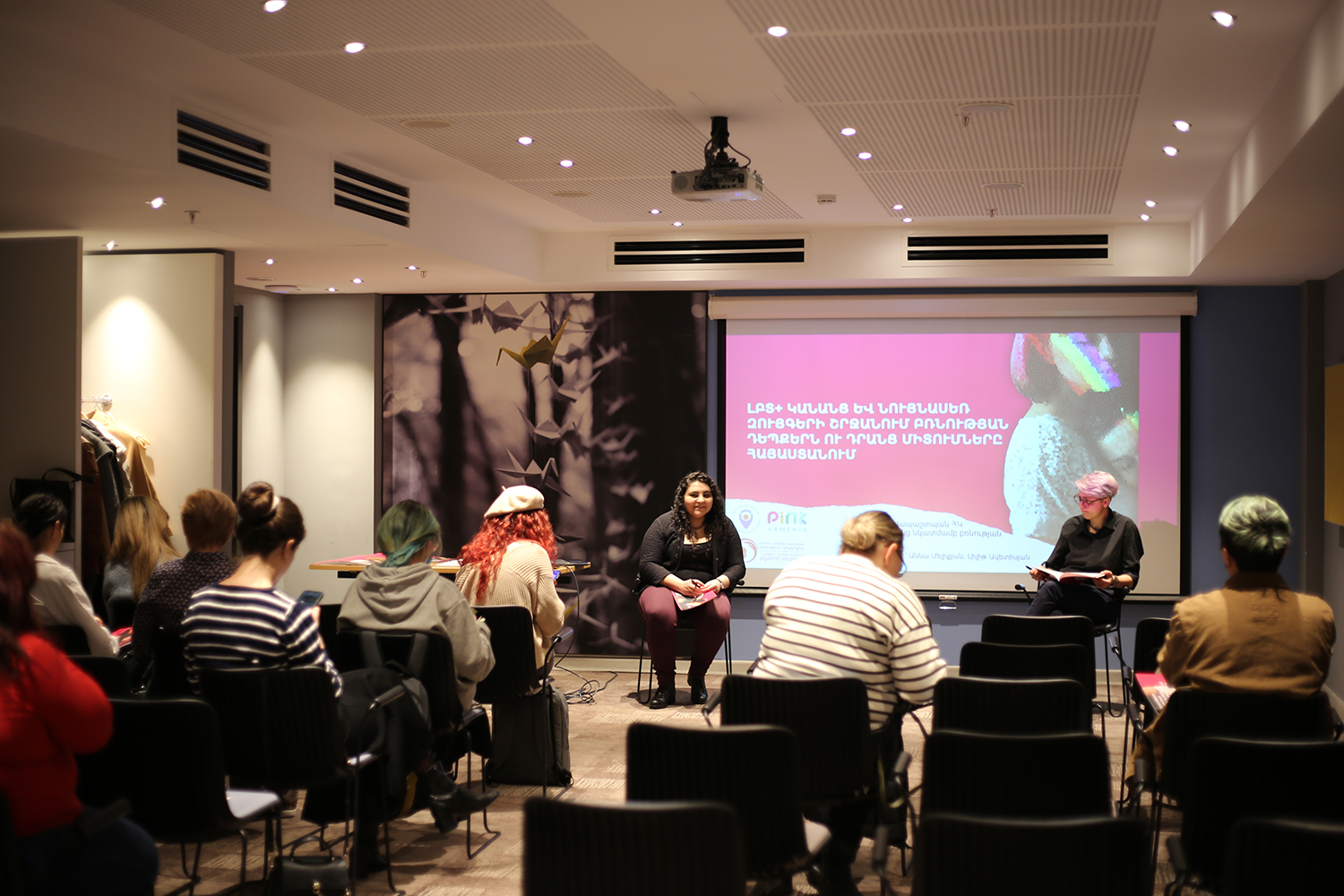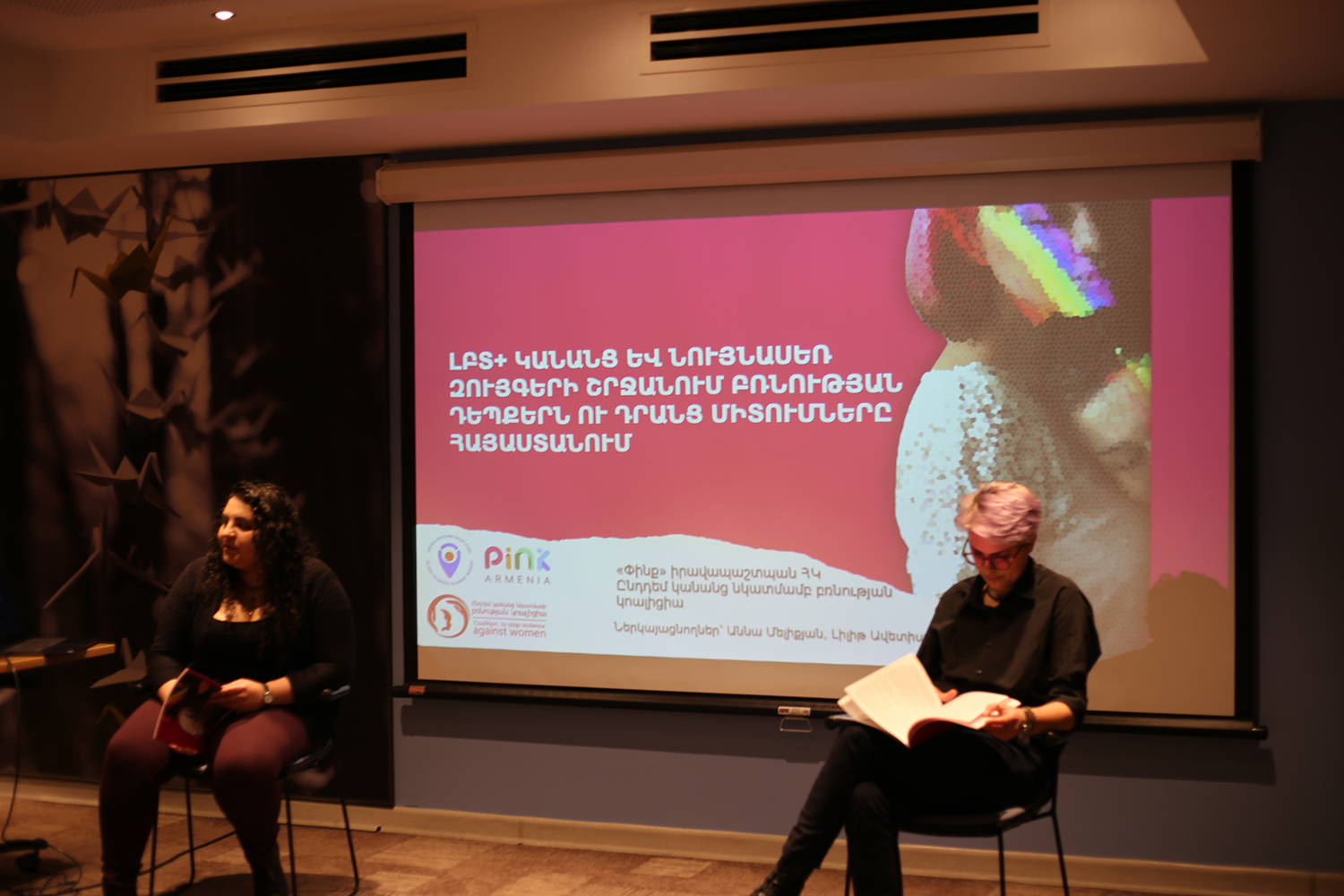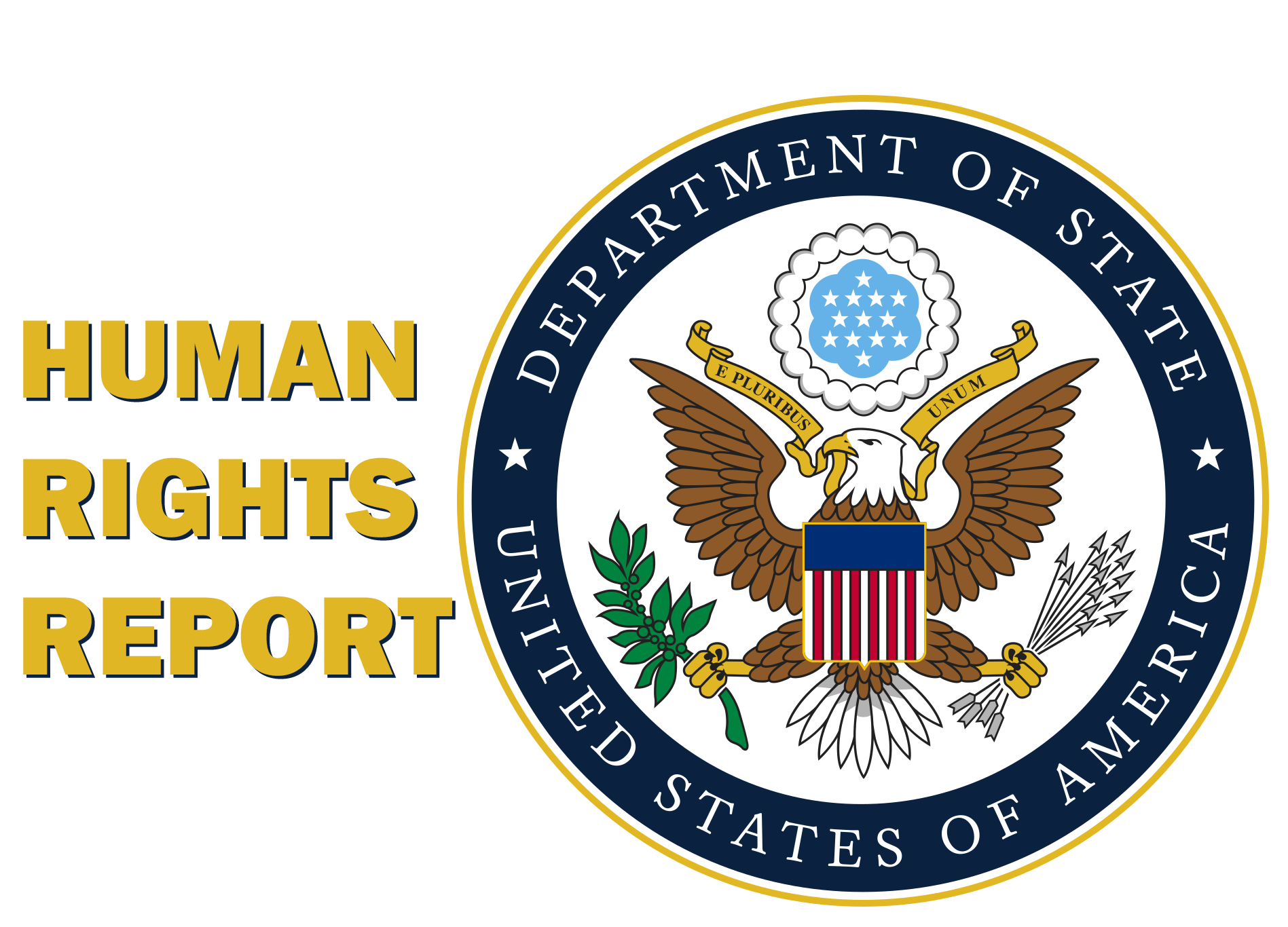Research presentation on violence towards LBT+ women and among same-gender partners
The “Cases and Tendencies of Violence towards LBT+ Women and Among Same-Gender Partners in Armenia” research presentation and its discussion took place on December 13, 2023. The event was conducted by joint efforts of “Pink” Human Rights Defender NGO and the Coalition to Stop Violence against Women within the project funded by the United Nations Women Fund.
The presented research aimed to observe the representations of violence towards lesbian, bisexual women, and trans+ people (LBT+) and same-gender intimate partner violence in Armenian context from various perspectives. It summarizes the existing legal regulations in Armenia, reports on the cases of violence towards LBT+ women and same-gender intimate partner violence, and the research aims to reveal the main tendencies in the experiences of the existing support mechanisms.
LGBT+ people, specialists, representatives from civil society organizations and activists attended the event. The research was followed by the discussion where the participants referred to the representations, tendencies, and cases of domestic violence towards LGBT+ people and same-gender intimate partner violence. The participants exchanged thoughts and recommendations on preventing violence, ensuring the reporting for the protection mechanisms, and applying to the existing support mechanisms.



About the research
“Cases and tendencies of violence towards LBT+ women and among same-gender partners in Armenia” research is conducted by the cooperative efforts of “Pink” human rights defender NGO and the “Coalition to Stop Violence” NGO within the project funded by United Nations Trust Fund.
The main purpose of the research is to observe the representations of violence in the Armenian context towards LBT+ women from various perspectives. It consists of two main parts. First part summarizes the issue’s international review and local context based on scarce existing evidence to provide an opportunity for defining the scope of the issues and their specifics. The latter also aims to be an informational material for those who learn about the issue for the first time or need more information about the context.
The second part includes the research which aims to observe the cases and tendencies of domestic violence towards LBT+ women and same-gender intimate partner abuse in Armenia through gathering the available comprehensive and primary data. As Armenia lacks the official data or systematic research about domestic violence towards LGBT+ people and same-gender intimate partner abuse, this is pilot research aiming to understand the legal regulations’ scope, data on documented cases and the experiences of NGOs or professional fields related to the issue. It is also important basis for conducting further research and defining the scope of needs.
The current part on research was conducted within the following directions:
- Analysis of domestic legislation and legal regulations, summary of the documented cases
The research was conducted through content analysis of the domestic legislation and legal regulations which refer to the country’s existing legal protections related the grounds of sexual orientation and gender identity/expression. More precisely, the existing legal regulations related to domestic violence and same-gender intimate partner abuse were observed. And the documented cases were related to the cases of domestic violence towards LBT+ women and same-gender intimate partner abuse which were presented in the reports about the human rights situation of LGBT people or documented by non-governmental organizations.
As a result of the review the existing legal regulations in the country don’t provide enough protection from discrimination, hate crimes and other human rights violations towards LGBT+ people. Despite the amendments in the new criminal code, which provides opportunity to ensure the protection at the legislative level, there is not enough evidence for its proper practical applications which could be visible in the upcoming years.
On the other hand, the legal regulations on preventing domestic violence and ensuring the response to the cases as well as their practical applications couldn’t provide enough protection from the cases of systematic violence by family members towards LGBT+ people, including LBT+ women, because of improper application and discrimination towards LGBT+ people. Moreover, the cases of same-gender intimate partner violence are neither being reported to the law enforcement bodies and documented because of the legal gaps, nor are accessible for the NGOs and professionals, because of not considering as such by same-gender partners.
- The research on support experience, perceptions, and tendencies of violence among same-gender partners among NGOs’ staff members and professionals
The interviews were conducted with the experts of the specialists and staff members of non-governmental organizations providing professional and non-professional support. More precisely, the interviews were conducted with lawyers, psychologists, social workers, peer counselors and community workers. The interviews aimed to reveal the experts’ perceptions about the same-gender intimate partner violence and the influences of the society, their experiences of providing support and reflections about the tendencies, as well as the prevention mechanisms of same-gender intimate partner violence.
As a result, we can indicate that in the cases of violence from family members LGBT+ people, including LBT+ women, don’t prefer reporting to the law enforcement bodies to avoid the double-victimization and not being sure that the existing mechanisms will prevent the violence in the future. This also indicates that despite there are legislative and legal protections on domestic violence, their applications are not always available for LGBT+ people. Even though the violence by family members towards LGBT+ people, including LBT+ women, is recognizable for the people, the cases of same-gender intimate partner violence are not being percepted as such which becomes visible because of the gaps in reporting such cases to the support mechanisms in civil society. Moreover, in some cases even the representatives of the civil society’s NGOs and specialists who provide support to LGBT+ people, including LBT+ women, couldn’t recognize the presence of violence in same-gender relationships. The latter is usually connected to the existing stereotypes in the society and misperceptions about same-gender relationships.
The research ends with the recommendations on preventing domestic violence towards LGBT+ people and same-gender intimate partner violence, proper responses to the occurred cases and support to the survivors of violence. The recommendations are addressed to various stakeholders: human rights organizations and activists, state agencies’ representatives, civil society, and international partners.




